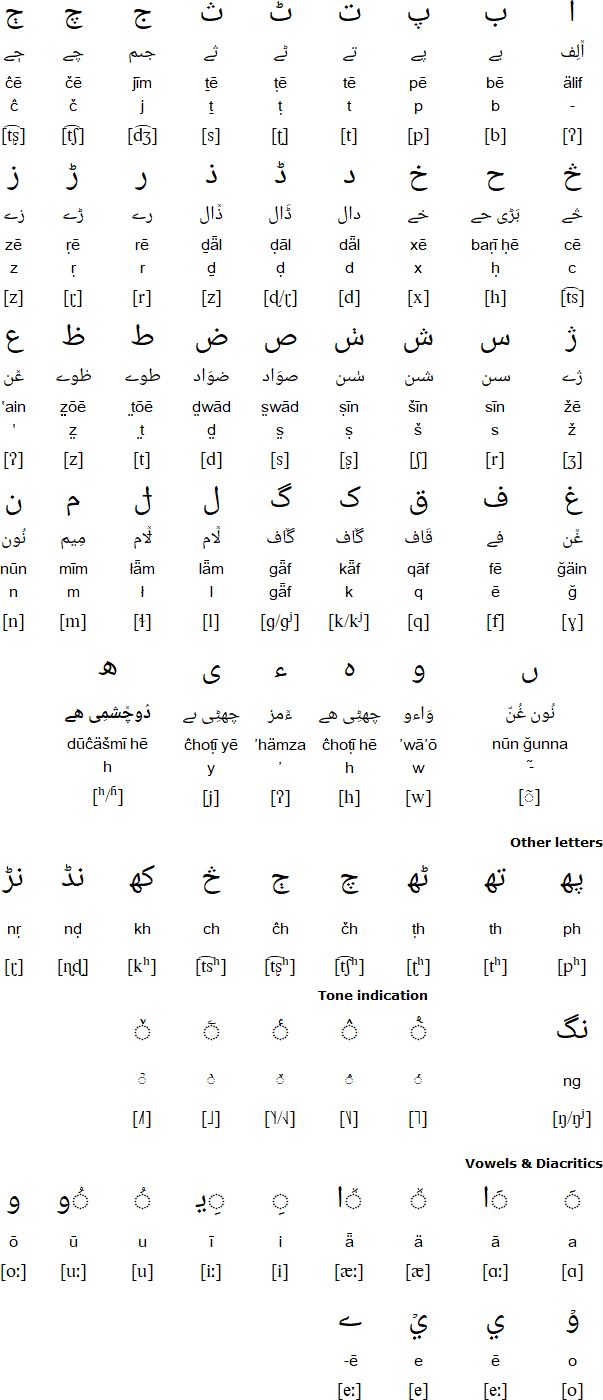Gawri is a Dardic language spoken by about 100,000 people in the northwest of Pakistan. In particular, it is spoken in the Swat Kohistan region of the upper Swat District, and in the upper Panjkora river valley of the Upper Dir districts in the Malakand Division of the Khyber Pakhtunkhwa Province. The language is spoken mainly by people over 30 or 40 years old, while children speak Pashto.
Gawri is also known as Kalami (کالامي), Garwi, Kohistani or Bashkarik. It is closely related to Kalkoti, Torwali, Indus Kohistani, and several other languages spoken in the same area.
Gawri is written with the Perso-Arabic script using an orthography devised by the Gawri spelling committee in 1995. It has been used as a language of instruction in some schools since 2008.

Download an alphabet chart for Gawri (Excel)
Details of the Gawri alphabet provided by Wolfram Siegel
گاؤری کمیونیٹی ڈیویلپمنٹ پروگرام حکومت ما منظور کٞریل اٞ تنظیم تھی۔ اساٞں مقصد پاٞنساں گٞھٹوگ تے سیاسی مقصد حاصل کٞروگ نات۔ اِیں تنظیمہ گاؤری جِب مئی باٞر کتاٞب اِتھائے چاپ کِیت تے دی تحقیق پا جاری تھی۔
Source: https://www.gawri.org/gwc/مُوں-باٞراٞ-مئی
The Gawri Community Development Programme (GCDP) is a local non-profit, non-political, officially registered organization working for community development in the Gawri-speaking areas through the implementation of education and health projects, as well as through the promotion, preservation, and documentation of the Gawri community's rich linguistic and cultural heritage.
Source: https://www.gawri.org/en/about-us
Information about Gawri
https://en.wikipedia.org/wiki/Gawri_language
https://fr.wikipedia.org/wiki/Kohistani_de_Kalam
https://wemountains.com/02/05/353/
http://www.language-archives.org/language/gwc
https://www.sil.org/resources/search/language/gwc
https://www.academia.edu/1992272/A_Sketch_of_Kalam_Kohistani_grammar
Dameli, Gawar Bati, Gawri, Indus Kohistani, Kalkoti, Kashmiri, Khowar, Palula, Sawi, Shina, Torwali, Ushoji
Adamaua Fulfulde, Aer, Afrikaans, Arabic (Algerian), Arabic (Bedawi), Arabic (Chadian), Arabic (Egyptian), Arabic (Gulf), Arabic (Hassaniya), Arabic (Hejazi), Arabic (Lebanese), Arabic (Libyan), Arabic (Modern Standard), Arabic (Moroccan), Arabic (Najdi), Arabic (Sudanese), Arabic (Syrian), Arabic (Tunisian), Arwi, Äynu, Azeri, Balanta-Ganja, Balti, Baluchi, Beja, Belarusian, Bosnian, Brahui, Chagatai, Chechen, Chittagonian, Comorian, Crimean Tatar, Dameli, Dargwa, Dari, Dhatki, Dogri, Domari, Gawar Bati, Gawri, Gilaki, Hausa, Hazaragi, Hindko, Indus Kohistani, Kabyle, Kalkoti, Karachay-Balkar, Karakalpak, Kashmiri, Kazakh, Khowar, Khorasani Turkic, Khwarezmian, Konkani, Kumzari, Kurdish, Kyrgyz, Lezgi, Lop, Luri, Maba, Maguindanao, Malay, Malay (Terengganu), Mandinka, Marwari, Mazandarani, Mogholi, Morisco, Mozarabic, Munji, Noakhailla, Nubi, Ormuri, Palula, Parkari Koli, Pashto, Persian/Farsi, Punjabi, Qashqai, Rajasthani, Rohingya, Salar, Saraiki, Sawi, Serer, Shabaki, Shina, Shughni, Sindhi, Somali, Soninke, Tatar, Tausūg, Tawallammat Tamajaq, Tayart Tamajeq, Ternate, Torwali, Turkish, Urdu, Ushoji, Uyghur, Uzbek, Wakhi, Wanetsi, Wolof, Xiao'erjing, Yidgha
Page created: 08.01.24. Last modified: 29.09.25
[top]
You can support this site by Buying Me A Coffee, and if you like what you see on this page, you can use the buttons below to share it with people you know.

If you like this site and find it useful, you can support it by making a donation via PayPal or Patreon, or by contributing in other ways. Omniglot is how I make my living.
Note: all links on this site to Amazon.com, Amazon.co.uk
and Amazon.fr
are affiliate links. This means I earn a commission if you click on any of them and buy something. So by clicking on these links you can help to support this site.
[top]